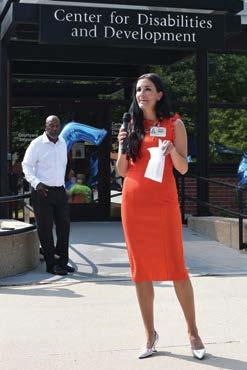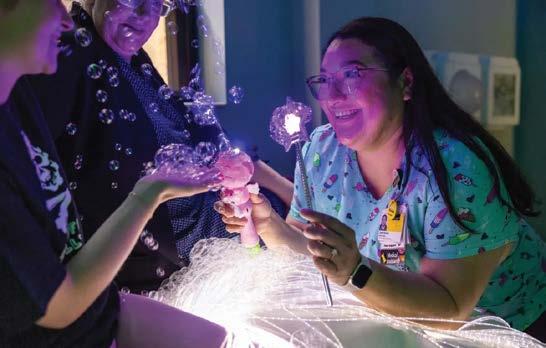

Center for Disabilities and Development
ANNUAL REPORT 2024




CDD Website
CDD launched its first unified website in July. Though CDD webpages are included on University of Iowa Stead Family Children’s Hospital (SFCH) website, CDD has never had its own website to represent the combined work we do under the CDD roof:
CDD Clinical Services
Iowa’s University Center for Excellence in Developmental Disabilities
Iowa Leadership Education in Neurodevelopmental and Related Disabilities Program
Hawkeye Intellectual and Developmental Disabilities Research Center
Visit our new CDD website: https://cdd.center.uiowa.edu/
Reflecting on the Past, Planning for the Future
This year, the Center for Disabilities and Development looked back on more than seven decades of providing care, supports and services for Iowans with disabilities and their families. In July, current and former CDD staff gathered in the courtyard with family and friends to celebrate CDD’s 75th anniversary. This year also brought leadership changes to CDD. Karen Hammar, MHA, MOT, OTR/L, was named Director after serving as Interim Director for much of 2024.
And Derrick Willis, MPA, announced he would retire after serving as Director of our UCEDD since 2018. With eyes on CDD’s future, we began work on a new strategic plan to carry us forward as we provide Iowa’s best evidence-based health care, develop community programs and education, and perform state-of-the-art research.
— CDD Leadership
Strategic Planning Goals
Increasing patient access to clinical care and disability services
Integrating research with patient care and training
Expanding programs of excellence and community engagement
Training interdisciplinary teams to ensure the highest quality of care and services
Clinical Services Highlights
Transition to Adulthood Clinic
The Transition to Adulthood Clinic is one of CDD’s blended programs, where clinical and UCEDD staff work together to share their expertise and guidance with patients and families. Young people who face barriers to independent living, and their families, meet with an occupational therapist, an employment specialist, a clinical social worker, a self-advocate, and a nurse who help them plan to live healthy and productive lives in the community.
PEERS® Training

With funding from Wellpoint, CDD and the Iowa LEND program co-sponsored the PEERS® for Adolescents Certified Training Seminar in May. The training prepares providers, educators and other professionals, including our pre-service ILEND trainees, to practice parentassisted intervention, and provides a model for an evidence-based social skills treatment for teens with ASD, ADHD, anxiety, depression and other social difficulties. Trainees represented multiple disciplines, including Social Work, Clinical Psychology, Counseling Psychology, Speech-Language Pathology, and Nursing.
CDD Serves as Family Reunification Center
The Center for Disabilities and Development is the Family Reunification Center for University of Iowa Health Care. CDD staff on the Reunification Center team meet regularly to practice in case of a mass casualty situation. Should an actual event take place, staff will:
Provide dependent care for children and individuals with disabilities
Identify and reunite families and children
Provide psychological first aid

New Vaccine Clinic for Patients with Unique Needs
CDD created a new vaccine clinic for children and some adults with unique needs, including sensory issues, anxiety, and other disabilities with funding from the Administration for Community Living. Clinical and UCEDD staff worked together to secure funding for the project, and meet the needs of clinic patients, including:
Half-hour appointments to allow time for the patients to relax
A fast-working lidocaine-based cream to numb the skin
Toys like bubbles and windmills to distract patients from the shots
Hippotherapy

This year, 14 patients participated in hippotherapy, with diagnoses ranging from autism spectrum disorder, cerebral palsy, down syndrome, arthrogryposis, low muscle tone, ADHD, and communication-based needs. CDD therapists facilitate hippotherapy at Miracles in Motion, incorporating the movement of horses into occupational and speech therapy sessions to help children achieve physical, sensory, and communication goals. By leveraging the horse’s rhythmic movements, therapists create a dynamic and engaging environment to improve balance, coordination, and language skills.
UCEDD Highlights
Iowa’s University Center for Excellence in Developmental Disabilities
(UCEDD) by the numbers:
Active grants/contracts totalled $8.3 million
Number of active grants/contracts: 14
Number of UCEDD staff: 52
FY24 Trainings: 197 events with 10,642 participants
Money Follows the Person (MFP)
Since 2008, Iowa’s Money Follows the Person (MFP) program has helped more than 1,000 individuals with ID and BI make the transition from facilities to community living. MFP continued to grow this year, with 134 transitions made by mid-November. With renewed funding since 2019, Iowa’s MFP has grown exponentially to include 13 transition specialists, 3 behavioral support specialists, a data analyst, and 4 supervisors. Six more hires are planned for 2025 to support this highly successful project.
Disability Exchange Podcast

UCEDD staff host and produce episodes of the DX podcast to center and elevate the voices of people with disabilities through meaningful conversation and connection. Season 4 episodes include:
Birdability with Cat Fribley
Improving Work in Iowa: Ben Grauer
Anyone Can Work with the Right Supports: Vocational Rehabilitation in Iowa
Iowa Compass
Iowa Compass has been connecting Iowans with disabilities and complex health conditions to local, regional, state, and national services and supports since 1986. Funded through a contract with the Iowa Department of Health and Human Services, it offers person-centered support via phone, chat, text, or email. In FY24 Iowa Compass served individuals from every one of Iowa’s 99 counties through 739 individual contacts and 20,831 resource database searches.

ON-TRAC
ON TRAC or “Our Network of Transition Resources to Adult Care,” our ACL Community Based Transitions grant, was developed to improve the quality of health care for adults with Intellectual and Developmental Disabilities (IDD), partnering with self-advocates, families, direct service providers, and clinical staff. Grant highlights include:
Access to the Curriculum in IDD Healthcare training for the Family Medicine Residents
10 mini grants of $5,000 to projects to improve services or access to healthcare for persons with IDD
Health fun fair for self-advocates offering the opportunity to socialize while learning health care tidbits.
4-part series “Taking Charge of My Health” for self-advocates
Youth Leadership Academy
Iowa’s Youth Leadership Academy (YLA) welcomed its fourth annual cohort of youth and young adults with disabilities to the leadership training program held virtually each summer. This year, 13 trainees ranging in age from 14 to 21, graduated from the academy. YLA is a collaboration between the Iowa DD Council, ASK Resource Center, Access 2 Independence, and Disability Rights Iowa.
Center of Excellence for Behavioral Health
Iowa’s Center of Excellence for Behavioral Health (CEBH) supports and promotes the use of centralized standards and best practices to advance evidence based behavioral health interventions. Funded by the Iowa Department of Health and Human Services, CEBH offers training and technical assistance to professionals who provide employment, housing, and community support for people with serious mental illness, and suicide prevention. In FY24 CEBH provided 16 trainings to an audience of 908 behavioral health providers across the state.
LEND Highlights

Poster Symposium
Trainees closed out the 2023-2024 academic year presenting their research at the annual poster symposium.
For the first time since 2019, the event was held in person at CDD, with the trainees from Puerto Rico attending in person. Symposium highlights included:
29 trainees presenting posters
14 professional disciplines, self-advocacy, and family issues represented
Research posters and project summaries posted on the CDD website: https://cdd.center.uiowa.edu/ research-posters
Disability in Iowa: Working Together
CDD teamed up with our sister organization, the Iowa Developmental Disabilities Council, to host “Disability in Iowa: Working Together.” Leadership from the LEND program and the DD Council have been working with Iowa State Representative Josh Turek to build awareness of disability issues among the state’s legislators. 48 individuals, including ten elected officials from both political parties, attended a learning session at CDD:
to increase their awareness of the work CDD and the DD Council do on behalf of Iowans with disabilities
to broaden their understanding of the experience of living with a disability
to learn about the challenges of getting access to supports and services
The event agenda featured presentations and discussions about these priorities:
Direct Support Professional (DSP) workforce shortage crisis
Gaps in Medicaid services
Building the capacity of providers in the state
Maximizing competitive integrated employment opportunities for people with disabilities
Partnership with Puerto Rico’s UCEDD
The partnership between Iowa’s LEND program and the University of Puerto Rico’s University Center for Excellence in Developmental Disabilities (PRUCEDD) began in 2015 to address the lack of access to providers trained in using applied behavior analysis (ABA) in Puerto Rico. A decade later, the partnership continues to:
help leaders in Puerto Rico build capacity for assessment and treatment of challenging behavior in individuals with developmental disabilities
help Iowa LEND trainees develop cultural awareness, as they learn about the strengths and challenges of providing services to individuals with disabilities in Puerto Rico

Poverty Simulation
The Iowa LEND program begins each academic year last with new trainees participating in a Poverty Simulation. This annual orientation event teaches trainees about the challenges people face when they live with limited resources to provide for their families. Highlights for trainees include:
Working together in small groups as “families”
Spending four simulated weeks, navigating community agencies and resources
Dayrin Lovan, co-core faculty for family, serving as proxy for the trainees from Puerto Rico, wearing an iPad to link them to the simulation via Zoom
IDDRC Highlights
In 2021, Iowa established the Hawkeye Intellectual and Developmental Disabilities Research Center, one of only 15 IDDRCs in the country. The “Hawk-IDDRC” fully integrates basic and clinical research across the lifespan—from conception to adulthood—that is tailored to an underserved rural population and focused on the prevention, diagnosis, treatment, and amelioration of intellectual and developmental disabilities. (iddrc.uiowa.edu)
Current Research at the Hawk- IDDRC
EarliTec Clinical Trial: The “Quantification of SocialVisual Engagement in ASD” study aims to determine if the EarliPoint™ Assessment for Autism Spectrum Disorder, using automated eye tracking, can help clinicians in the diagnosis and assessment of children ages 3-7 years who have or are suspected to have autism spectrum disorder and/or related developmental delays.

AGES: The Autism Genetics and Epigenetics Study (or “AGES”) aims to better understand how genetics and social experience may influence the way children develop. This study will use:
audio recordings of language experience
a smartphone tool called BabySteps to collect data at home
biospecimen samples collected during their clinic visit, to better understand autism development
The Hawk-IDDRC hosts monthly seminars on a wide range of related topics. These and other seminars are archived and available to watch online.
https://iddrc.uiowa.edu/overview-hawk-iddrc/recenthighlights


PAGES: The Perinatal Autism Genetics and Epigenetic Study (or “PAGES”) aims to better understand how early life experiences and genetic factors may influence the way children develop.
Highlights:
Recruit over 7,200 pregnant women and monitor them throughout their pregnancy, delivery and their child’s development for autism
Use the BabySteps smartphone research tool to study predictors of autism or other developmental challenges
Using fNIRS in IDD: This study (under development) will use functional near-infrared spectroscopy (fNIRS) to examine brain responses in individuals with and without intellectual and developmental disabilities (IDD).


Statewide Impact by County
CDD saw a total number of patients from 17 states from as far away as Florida and Arizona
11,403 unique patients
1,001–6,000
14,355 total outpatient visits for
Primary
Payers for CDD Visits
FY24 (July 1, 2023June 30, 2024)
CDD
Patient
Ages (in Years)
FY24 (July 1, 2023June 30, 2024)
CDD Patient
Ethnicity
FY24 (July 1, 2023June 30, 2024)

Vision
People with disabilities living healthy and independent lives
Mission
At the Center for Disabilities and Development, we work together with individuals with disabilities and their families through evidencebased clinical care, state-of-the-art research, community engagement, and interdisciplinary training to ensure an inclusive and accessible society.
For additional information, contact: University of Iowa Stead Family Children’s Hospital Center for Disabilities and Development
877-686-0031 (toll-free); 319-353-6900 (local) cdd.center.uiowa.edu/
